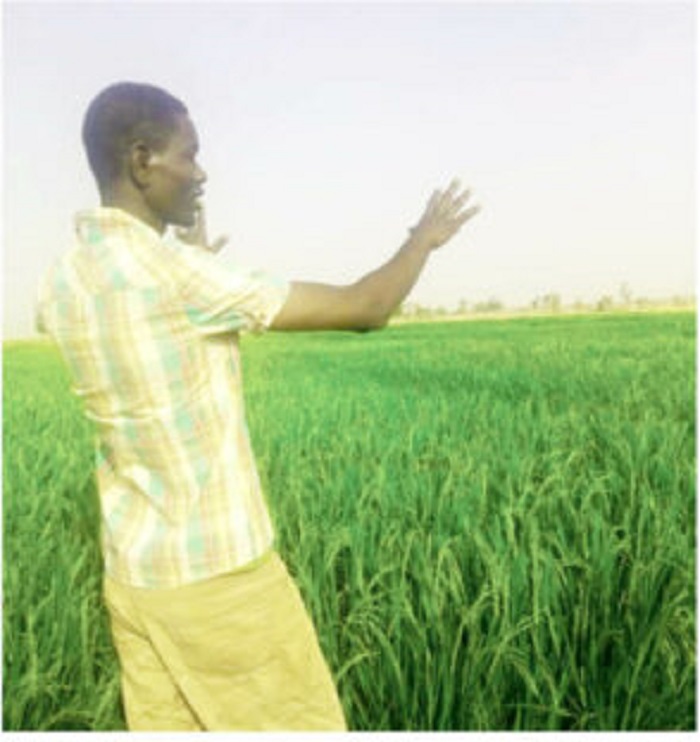Yobe youths make fortunes from agriculture
The rising unemployment in Nigeria has exposed youths to other means of generating income, especially in agriculture. For many youths in Yobe State, farming is one of the opportunities they rely on as a means of livelihood. Reps to halt abuse in orphanages Herders back Buhari as Afenifere, Ohanaeze reject grazing routes recovery It is […]

Mohammed Gasma supervises his rice farm in Gashua Bade
The rising unemployment in Nigeria has exposed youths to other means of generating income, especially in agriculture.
For many youths in Yobe State, farming is one of the opportunities they rely on as a means of livelihood.
- Reps to halt abuse in orphanages
- Herders back Buhari as Afenifere, Ohanaeze reject grazing routes recovery
It is one of the thriving businesses that is practised in all parts of the state due to its vast arable lands.
Our correspondent who went round to interact with farmers encountered many of them busy clearing their farmlands to plant for the rainy season.
Sharing his success stories, Babagana Modu, a young farmer who said he started farming long ago told Kanem Trust that he inherited the practice from his parents.
Modu maintained that he has passion for the business because it is economically rewarding more than any other business.
He disclosed that he gained over N700, 000 profit within just three months when he invested N300, 000 on his rice farm last year.
“That was only one experience in a small rice farm, I also got N500, 000 profit from my sesame farm.
“Upon all the businesses I engaged in before, I can tell you none of them could give me half of what I am getting from farming,
“I am into both dry and rainy seasons farming non-stop and I understand their peculiarities and challenges.
“If you can give me any amount today, I will not hesitate to add it up to my farming investment.
“The reality is that I cannot even compromise farming to N30,000 government minimum wage”.
Mohammed Musa Gasma, a rice farmer, said his teaching job did not deter him from farming.
He explained that as a lecturer he has enough time and energy to channel into agriculture.
“Apart from my reward, I employed about 50 people from clearing, sowing, bed laying and watering of the farm.”
He, however, agreed that no investment is free from challenges, explaining some of the problems he faced include difficulty in accessing services and inputs like tractors and fertilizer and the high cost of petrol.

Another young farmer, Maidala Tata, described farming as a norm and asset to rural dwellers noting that it is the easiest way of getting money.
“For us, it is necessary because we can’t stay in the village and say we cannot go to the farm, where do we get food?”
Tata said he couldn’t explain how much he gains from farming because it is the only business he depends on to cater for a living.
“I produced both food and cash crops such as maize, rice, sesame, groundnuts, onion, pepper, watermelon, groundnut among others.
“After each cultivating period, I offer some goods for sale to meet up daily demands, give out some as alms and store my foodstuff for a year all from the farm produce.
“I am a responsible family man and support all my dependents from farming, like I said we could do better if we have good roads”
He identified lack of good road network as one of the challenges that hinder farmers in accessing the market at his Wacakal village of Karasuwa Local Government Area in Yobe State.
Meanwhile, a large scale farmer and Chairman North East Commodity Association (NECAS) Yobe State branch, Nuhu Baba Hassan said farming remains one of the lucrative businesses that cut across ages and gender, and providing employment opportunities and contributing to the country’s GDP
According to him, although, farming suffers negative perceptions, seen as poor man’s work that involves labour and insufficient financial gains, they are changing the narrative by practically engaging in it.
“I own farms of different sizes and I am making a lot from them, I am encouraging our youth to fight idleness.
“We’ve made tremendous successes in the last couple of years in terms of supporting farmers with farm inputs and loans.
“You may also recall that last year, NECAS procured 100 tractors and presented them to the teeming farmers to support the state government.”
